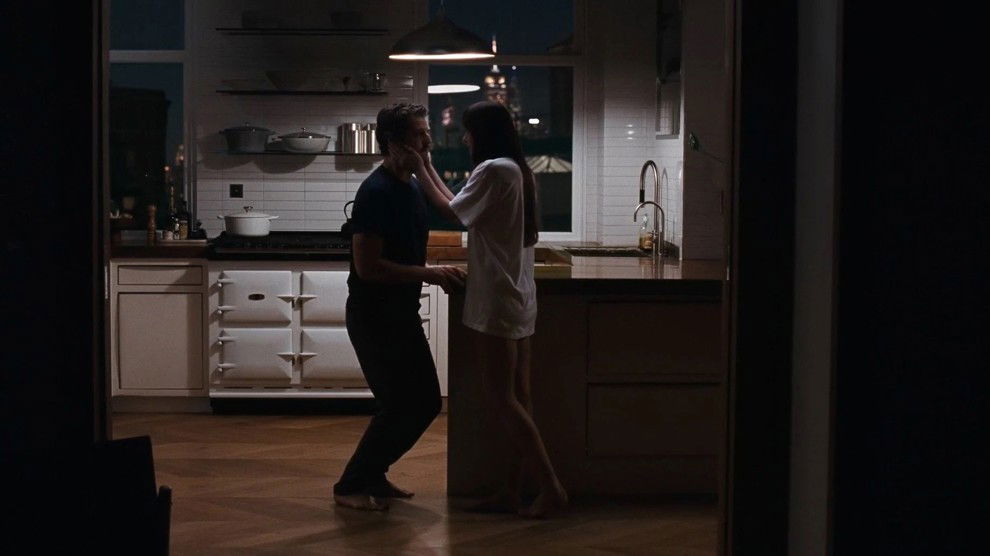About Materialists
Released in theaters midyear and now streaming on HBO Max, the film quickly became one of the platform’s most-watched titles. The blend of romantic comedy and social critique caught audiences off guard and divided critics who expected another melancholic reflection from the director, as in Past Lives.
But Song takes the opposite route: instead of exploring the pain of what was never lived, she examines the emptiness of what was purchased.
With a precise eye and impeccable mise-en-scène, Materialists turns the pursuit of love into a spectacle. Between elegant dinners, sharp dialogue, and tense silences, the film becomes a showcase of desires packaged like luxury goods. It is beautiful, ironic, and cruel, much like the romantic marketplace it depicts.

The Stock Market of Love
The protagonist, Lucy (played by Dakota Johnson), is a New York matchmaker who arranges dates for millionaire clients using an emotional algorithm that combines data, appearance, and status. For her, love is an equation to be solved, not a matter of chance. Yet her own life does not follow the same logic, and when work and desire collide, her carefully controlled world begins to crack.
The film unfolds through meticulously calculated encounters and moments of emotional dissonance, creating a constant sense of imbalance. Celine Song directs the story with surgical precision: everything looks clean, elegant, and hollow. The characters move through upscale restaurants and pristine apartments, but what truly drives them is the fear of not being enough (emotionally or financially).
By steering clear of the usual romantic comedy clichés, Materialists positions itself on the opposite side of the spectrum. There is no sweeping soundtrack, no obvious chemistry. The tension comes from silence, doubt, and irony. Lucy no longer believes in love, but she cannot live without selling the illusion of it.
Celine Song builds this universe with a precision that fuses the sarcasm of social satire with the sophistication of urban drama. The result is a film that feels light yet lands heavily, because it touches on a central contemporary contradiction: do we actually want to fall in love, or do we want a product custom-made for each of us?

Precision and Irony
It is impossible to discuss the film without considering Celine Song’s trajectory as a director who emerged as a phenomenon. The success of Past Lives placed her under a rare spotlight for a South Korean filmmaker based in the U.S., and her second feature carries the burden of proving her brilliance was no coincidence.
That heightened expectation may explain the mixed reception. Yet what some critics interpreted as “coldness” can also be understood as aesthetic coherence. Song films the commodification of love using the same logic she critiques. Every shot is symmetrical, precise, and impersonal. The camera observes but does not intervene.
There is a restrained beauty in how she frames emptiness, mirrors, silences at dinner, and the distance between bodies that are supposed to love each other. The visual refinement itself becomes ironic. Lucy’s world is stunning to behold but impossible to inhabit.
Through this, Celine Song confirms something essential: her focus is not on love itself but on the space between love and its illusion. She does not repeat Past Lives, and that is precisely her merit. She dares to explore the surface and finds depth within it.

Comic Irony
The comedy in Materialists emerges from reversals and discomfort.
Chris Evans, often a symbol of confidence and success, plays a man who is broke and emotionally adrift. Pedro Pascal, today’s charismatic favorite, portrays a millionaire incapable of genuine affection. And Dakota Johnson, balancing charm and detachment, plays a woman who orchestrates perfect romances but no longer believes she deserves one.
The humor is dry, almost cruel. The laughter comes from tension, not levity. Celine Song toys with audience expectations, hinting at a classic romantic comedy but delivering existential unease wrapped in luxury.
These ironies drive the film forward. They expose a modern hypocrisy: we want to be loved for who we are, yet we sell ourselves for what we own. In the end, laughter becomes nothing more than a mask for discomfort.

Cliché or Critique?
Although it uses familiar elements such as a love triangle and the tension between love and security, the film refuses the comfort of predictability. Song’s choices always move away from emotional release.
The chemistry between characters is restrained, sometimes nonexistent, and that is intentional. The film reminds us that real love is rarely cinematic. Instead of chasing a grand romantic finale, flawless scenes, or perfectly compatible couples, it chooses to show what love looks like today: imperfect.

The Price of Love: Is Materialists Worth Watching?
Materialists is not about finding love but about confronting what love has become. In an age of dating apps, emotional curation, and performative relationships, Song suggests that romance has become a luxury and sincerity, an almost radical act.
Celine Song offers a film that provokes more than it soothes. A comedy about the melancholy of loving in a world where everything carries a price tag. Beautiful, elegant, and cold, yet deeply human for exactly that reason.
In the end, Materialists does not want us to believe in love. It wants us to recognize how thoroughly it has been sold.












— Comments 0
, Reactions 1
Be the first to comment